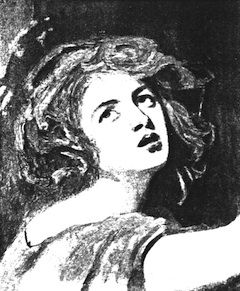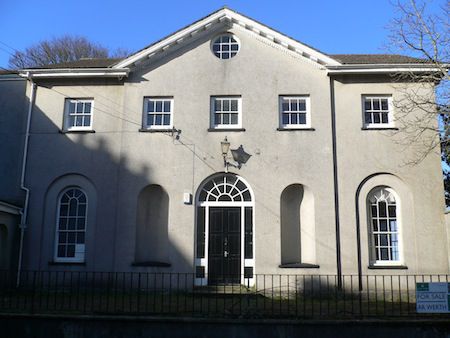Lady Emma Hamilton
8th July 2015

Lady Emma Hamilton
2015 has another anniversary that connects to Pembrokeshire and having mentioned her in my last article, I thought it appropriate to expand a little on Lady Emma Hamilton who died two hundred years ago in 1815.
Emma wasn’t born with either of the names, Emma or Hamilton, and neither was she born into an aristocratic family. She was born Amy Lyon in Cheshire in 1765 into extreme poverty. But Emma had the asset (or added disadvantage) of being very beautiful; (William Hamilton once described her as being, ‘finer than anything to be found in antique art’). It meant that by the time that she was fifteen, she had produced her first child. Various wealthy men took an interest in her and at the age of seventeen she began living in London with Charles Greville, the nephew of Sir William Hamilton, British Ambassador to the Court of Naples.
Sir William had married Catherine Barlow in 1758, whose huge Slebech Park estates spread over the Slebech and Milford Haven area, which as a town did not then exist. In 1782, Catherine died and the idea was promoted to Hamilton of establishing a new town at Milford.
Whilst on leave in 1784, Hamilton visited his nephew Greville and became infatuated with Emma. An arrangement seems to have been struck between Greville (who needed money) and Hamilton, that Greville would become Hamilton’s land agent, and further, would have responsibility for building the new town of Milford Haven in return for Greville relinquishing his interest in Emma in favour of Hamilton. Hamilton was 34 years older than Emma. In 1791, Emma moved from being Hamilton’s mistress to becoming his wife and became Lady Emma Hamilton.
In Naples, Emma’s beauty and her innovative ‘attitudes’ which she performed for her husband’s guests captivated all who saw them. These were a combination of poses and dance in costumes suggesting past famous ancients which might nowadays be termed a form of charades with audiences trying to guess what or who was being suggested. It started a craze across Europe with many emulating Emma and in the meantime European Royalty journeying to Naples to see her.
Nelson came into Emma’s life following his remarkable and complete victory over the French at Abukir Bay in 1798. Wounded, he took his ship to Naples and immediately fell under Emma’s spell; they became lovers in a remarkably short time. Nelson began acting irrationally, even ignoring Admiralty orders, until summoned home. This coincided with Sir William’s decision to retire as a result of ill health and the three of them undertook a circuitous route around Europe before arriving in this country in 1800.
In 1801 Emma gave birth to Nelson’s daughter, Horatia (lived until 1881), and all of this odd family unit together with Emma’s mother started living at Merton Place, a property near Wimbledon that Nelson had purchased.
In August 1802 Nelson, Emma and Sir William journeyed to view the progress of the new town of Milford Haven. Although Trafalgar was still three years away, Nelson was already a hero. Together, Emma and Nelson were the most famous people in the country.
The problem for the upper classes was that Nelson’s abandonment of his wife and his blatant arrangement with Emma (and her husband) outraged them and it became fashionable to snub them.
In Pembrokeshire, Captain Foley (hero of Abukir Bay) was visited in his home, Ridgeway in Llawhaden and the group then stayed at Foley House in Haverfordwest which was the venue for a public breakfast after which the populace took the horses from the carriage and pulled it around the town. Nelson was awarded the freedom of the town and county.

Foley House, Goat Street, Haverfordwest
In Milford Nelson made a speech at the New Inn which was renamed The Lord Nelson Hotel.
After Nelson’s death, Emma attended a play every night in London entitled, ‘The Death Of Nelson’ during which she affected a dramatic swoon on each occasion that the climax was reached of the ‘death’ on stage. She became debt ridden, dependant on alcohol and fat. She subsequently went to live in Calais despite the Napoleonic Wars (to escape debtors) where she died in 1815.